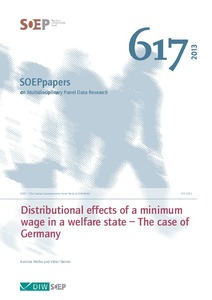Distributional effects of a minimum wage in a welfare state: the case of Germany
"A popular argument for a federal minimum wage is that it will prevent in-work poverty and reduce income inequality. We examine this assertion for Germany, a welfare state with a relative generous means-tested social minimum and high marginal tax rates. Our analysis is based on a microsimulatio...
| Main Authors: | , |
|---|---|
| Institution: | ETUI-European Trade Union Institute |
| Format: | TEXT |
| Language: | English |
| Published: |
Berlin
2013
DIW |
| Subjects: | |
| Online Access: | https://www.labourline.org/KENTIKA-19121280124919494629-Distributional-effects-of-a-mi.htm |
| Summary: | "A popular argument for a federal minimum wage is that it will prevent in-work poverty and reduce income inequality. We examine this assertion for Germany, a welfare state with a relative generous means-tested social minimum and high marginal tax rates. Our analysis is based on a microsimulation model that accounts for the interactions between wages, the tax-benefit system and net incomes at the household level as well as employment and price effects on the distribution of incomes induced by the introduction of a minimum wage. We show that the impact of even a relatively high federal minimum wage on disposable incomes is small because low wage earners are scattered over the whole income distribution and wage increases would to a large extent be offset by reductions in means-tested welfare transfers and high marginal tax rates. Taking into account negative employment effects and increases in consumer prices induced by the minimum wage would wipe out any positive direct effects on net incomes of households affected by the minimum wage." |
|---|---|
| Physical Description: | 28 p. Digital |

